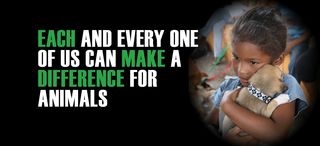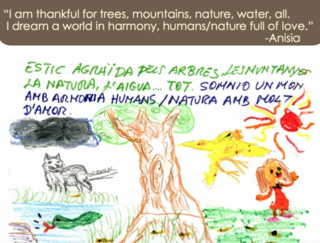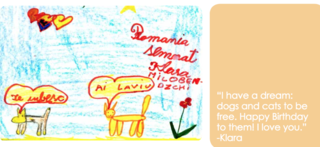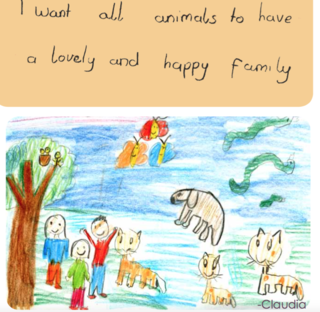Motivation
World Animal Day: A Global Celebration For Hopeful Futures
While there's been some progress nonhumans still deeply suffer in a human world
Posted October 3, 2017
October 4th is World Animal Day 2017. It's a wonderful time to carefully assess how nonhuman animals (animals) are faring in a human dominated world and to celebrate successes in reducing and abolishing pain, suffering and death "in the name of humans." And, coincidentally, although I don't really believe in coincidences, this is my 1000th essay on this site. I was wondering what I might write on this occasion, and I am thrilled to see the unplanned convergence of this special day for animals and my writing for Psychology Today. I couldn't have planned it better if I tried.
World Animal day is a global event, and throughout the world there are celebrations of successes and hope. One of the themes of this special day is offered in this poster, namely, everyone can make a difference in the lives of other animals.

And, along with celebrations of what has been accomplished to protect other animals from wanton and horrific abuse and death, it's necessary to look ahead so as to make life better and better for the billions of nonhumans who still suffer and die at the hands of humans.
The science of animal well-being
One topic about which I've written concerns how the science of animal welfare fails other animals because it patronizes them "in the name of humans." To this end, in our book The Animals' Agenda: Freedom, Compassion, and Coexistence in the Human Age, Jessica Pierce and I have argued that we need to replace the science of animal welfare with the science of animal well-being in which the life of every single individual matters. Our view is consistent with the goals of the rapidly growing interdisciplinary field of compassionate conservation in which the guiding principles are "First, do not harm" and every individual counts.
Our book took root out of a shared sense of frustration with science—and with a particular kind of science. We had both assumed, earlier in our careers, that the scientific study of the emotional and cognitive lives of animals would lead to major changes in how humans treat other animals—how could it not? Once people see that animals are intelligent and feeling creatures, just like us, they won’t be able, in good conscience, to inflict suffering and deprivations. It seemed, as we looked around, that the accumulating research into the inner lives of animals had done nothing to help their situation—more animals are being raised and slaughtered for food, more are being held captive in entertainment venues, invasive laboratory research is expanding, and so forth. We had many discussions where we puzzled over this seeming paradox: the more we know, the worse things are getting for animals.
The Animals’ Agenda was our attempt to figure out why science is failing animals. The answer, in brief, is that the study of animal emotion and cognition has been channeled into animal welfare science. And “welfare science” is not science in the service of animals, but rather science in the service of industry.
The science of animal well-being that we develop focuses on individual animals and would not allow animals to be used and abused in the way that welfarism allows. Welfarism puts human needs first, and tries to accommodate animals within the “human needs first” framework. Well-being broadens the question of “what do animals want and need” beyond the welfare box, and tries to understand animal preferences from the animals’ point of view. For example, welfarism asks whether mink on a fur farm would prefer taller or shorter cages; well-being challenges the idea mink should be in battery cages on a fur farm in the first place, because they cannot have true well-being or “good lives” under such conditions—no matter how many welfare modifications we make.
So, the bottom line for welfarists is that they’re trying to make life marginally better for animals in the arenas in which animals are exploited, leaving unquestioned the human practices that cause tremendous animal suffering. Welfarism is a salve for our conscience.
Bridging the knowledge translation gap
We also argue that in the future we must use what we know on behalf of other animals. We write about the knowledge translation gap, referring to the practice of ignoring tons of science showing that other animals are sentient beings and going ahead and causing intentional harm in human-oriented arenas. On the broad scale, it means that what we now know about animal cognition and emotion has not yet been translated into an evolution in human attitudes and practices. A great example of the knowledge translation gap is found in the wording of the federal Animal Welfare Act (AWA), which explicitly excludes rats and mice from kingdom Animalia (even though a first grader knows that rats and mice are animals). In post-election parlance, we could also call the AWA’s slip up an “alternative fact.”
The state and future of other animals
We need another and a wiser and perhaps a more mystical concept of animals. Remote from universal nature, and living by complicated artifice, man in civilization surveys the creature through the glass of his knowledge and sees thereby a feather magnified and the whole image in distortion. We patronize them for their incompleteness, for their tragic fate of having taken form so far below ourselves. And therein we err, and greatly err. For the animal shall not be measured by man. In a world older and more complete than ours they move finished and complete, gifted with extensions of the senses we have lost or never attained, living by voices we shall never hear. They are not brethren, they are not underlings; they are other nations, caught with ourselves in the net of life and time, fellow prisoners of the splendour and travail of the earth. Henry Beston, The Outermost House
This quote from Henry Beston's lovely book is one of my all-time favorites. I go to it constantly because it says so much about who other animals are and about our relationships with them. First, we do indeed view others through our own senses, and as we have clearly seen, dogs don’t sense the world how we do. So our views are, indeed, distorted. We also patronize them for not being like us, for what we perceive as their incompleteness, as if we are complete. This misrepresentation allows some people to place other animals below us on some mythical evolutionary scale. They’re referred to as “lower” beings, a move that results in rampant mistreatment and egregious abuse. As Beston asserts, “And therein we err,” for we should not be the template against which we measure other animals.
I also like how he views other animals as “other nations,” since this asks us to view them as the beings they are, not as what we want them to be. And surely, other animals are caught up in the “travail of the earth,” captive to whatever we want them to do and whoever we want them to be. As we’ve seen, this makes for a good deal of stress in their lives as they try to adapt to a human-dominated world.
Ecocentrism, rewilding, and hope
“That the universe is a communion of subjects rather than a collection of objects is the central commitment of the Ecozoic. Existence itself is derived from and sustained by this intimacy of each being with every other being of the universe.” (Brian Swimme and Thomas Berry, 1994, The Universe Story: From the Primordial Flaring Forth to the Ecozoic Era--A Celebration of the Unfolding of the Cosmos, p. 243).
I'm a card-carrying optimist and I fully believe that with a lot of hard work we can continue to make the lives of other animals much better as time goes on. In an essay called "A Journey to Ecocentrism: Earth Jurisprudence and Rewilding" I argue that if we adopt ecocentrism in our hearts and in our actions there is hope. Ecocentrism recognizes that a nature-centered, rather than a human-centered, view of nature, will mean that humans will have to change their values if they favor humans over nature as a whole, including nonhuman animals and their homes.
The idea that all of Earth's residents are part of an interconnected community forms the basis of my ideas about personal ‘rewilding’ that are outlined Rewilding Our Hearts: Building Pathways of Compassion and Coexistence. The ideas are novel and call for personal (and some might say individual) spiritual transformations that serve to reconnect people to nature and to embrace the magnificence of our planet. All individuals are seen as stakeholders who must work together.
In Rewilding Our Hearts I argued that by personally rewilding, by undoing the unwilding and by reconnecting and becoming re-enchanted with nature, including other animals, we can overcome negativity and see the world in more positive ways. What I call ‘the ethology of rewilding’ entails focusing on what we know about who other animals truly are and using this information to come to a deeper appreciation of the similarities and differences among nonhuman animals and between nonhuman and human animals.
In this book I also offer what I has morphed into the '12 P's of rewilding’ -- being proactive, positive, persistent, patient, peaceful, practical, powerful, passionate, playful, present, principled, and proud. During the past 3 years the list has grown from 8 P's to 12, and I hope that it will continue to expand over time.
The Charter for Animal Compassion
Let's also keep in mind and heart the Charter for Animal Compassion (please see "The Charter for Animal Compassion for Non-Humans and Humans" for an interview I conducted with Rob Percival, its founder and director). Many of the goals of this charter are in line with my Universal Declaration on Animal Sentience (for more discussion please see "A Universal Declaration on Animal Sentience: No Pretending") and blend in nicely with the goals of Animal Sentience: An Interdisciplinary Journal on Animal Feeling.
The importance of working with youngsters

It's also essential to work with youngsters. They are the hope for the future and we need to do all we can to help them keep their hopes and their dreams alive. In a project in which youngsters were asked what they're thankful for and what their dreams are, Jane Goodall and I learned that there really is a lot of hope already brewing in youngsters around the world. Drawings by the youngsters and statements about what they're thankful for and what they dream can be seen in Kids and Animals, a book that is available online for free. A wonderful example was provided by Anisa, at a Roots & Shoots program in Barcelona, Spain.

Klara, who lives in Romania, wrote, "I have a dream: dogs and cats to be free. Happy Birthday to them. I love you!" Conner, from Denver, Colorado, was thankful for trees, and Claudia, in Italy, wanted all animals to have a lovely and happy family. Kids and Animals is full of inspirational statements and drawings, and I find myself constantly going back to it to rekindle hope and to keep my dreams alive.


World Animal Day calls on all people to do something for other animals. As Gretchen Wyler famously said, "Cruelty can't stand the spotlight." And, there's no reason that it should.
We're most fortunate to have other animals in our lives, and we must work for the day when all of them feel most fortunate to have us in their lives. Everyone who can so something must do something.
Other animals need all the help they can get. In the long run, we’ll all be better off, nonhuman and human alike, when we work as a united community to make the world a better place for everyone.
Let's commemorate World Animal Day and make it a global celebration for hope and for better futures for all beings. In fact, I would like to see everyday be World Animal Day. There's really no reason why this can't be so.
Marc Bekoff’s latest books are Jasper’s Story: Saving Moon Bears (with Jill Robinson); Ignoring Nature No More: The Case for Compassionate Conservation; Why Dogs Hump and Bees Get Depressed: The Fascinating Science of Animal Intelligence, Emotions, Friendship, and Conservation; Rewilding Our Hearts: Building Pathways of Compassion and Coexistence; The Jane Effect: Celebrating Jane Goodall (edited with Dale Peterson); and The Animals’ Agenda: Freedom, Compassion, and Coexistence in the Human Age (with Jessica Pierce). Canine Confidential: Why Dogs Do What They Do will be published in early 2018. Learn more at marcbekoff.com.




